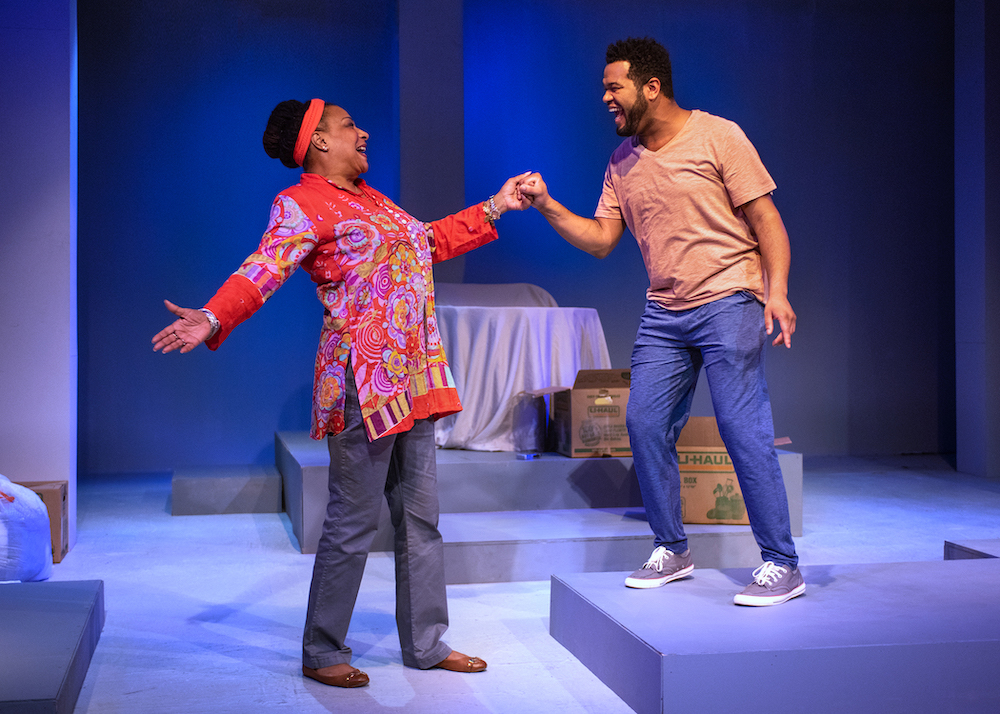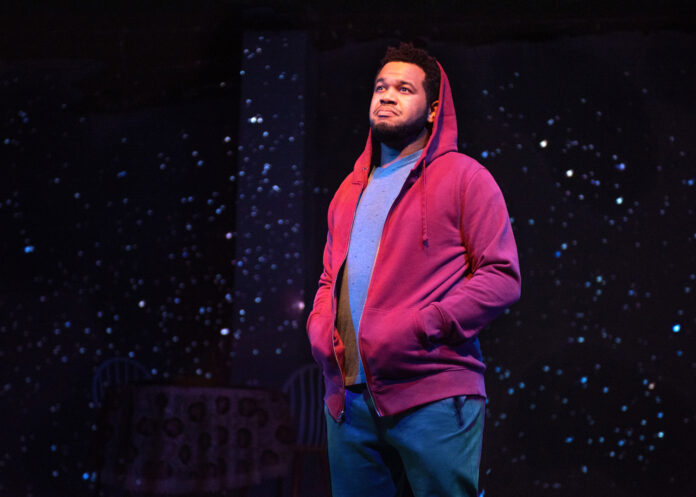COVID is the catalyst in Harrison David Rivers’ Interlude (through November 7), the newly-commissioned world premiere expanded from last year’s “radio play” version (also for NCTC). Main character Jesse Howard (Donald Ray Antoine) was in Rome in early 2020, allowing he and boyfriend Luca to witness the coronavirus in its relative infancy. By the time Jesse returns Stateside, the virus hits hard and he’s out of a condo. With no other prospects, the kindergarten teacher-playwright returns home to Kansas—“like Dorothy”—to shelter-in-place with his Trump-loving father and housewife mother Sheryl (Jan Hunter).
Between watching George Floyd die on TV, doing therapy sessions over Zoom, and being nagged by his parents, Jesse’s only real outlet is to record his thoughts onto an old tape recorder he finds in the basement. This, and the occasional text to Luca, allow him to openly state his disdain for his old red state home. “I don’t know who I am here,” he texts at one point.
As with the original audio version, the newly-staged version of Interlude is an imperfect piece. The original was a solo show, with Jesse’s stream-of-consciousness soliloquies definitely giving the impression of someone who desperately needed to vent. But it also lacked a real focus. To a degree, that was understandable: 2020 was a trying year to be Black, gay, and/or American, and Jesse (played empathetically by Antoine) is all three. His struggle to maintain optimism in a collapsing world is palpable.
Still, he comes off as pieces of a character (a playwright whose work we never hear, a teacher whose lessons we never glean, a lover whose boyfriends we never meet) rather than a full person. It’s to the credit of Antoine and director Shawn J West (who also directed the original audio version) that we so easily find ourselves involved in Jesse’s reminiscence of first crushes at camp and first brushes of racism in his youth.
Some of the focus the original lacked is added by the addition of Sheryl, but only to a degree. Jan Hunter finds the right notes for the role, but Sheryl never really moves beyond being much more than a plot device. Even though we see her both in- and outside of Jesse’s taped recollections, she primarily exists for the sake of she and Jesse having dinner together at the play’s climax. When she inevitably does the nosy-mama thing of playing Jesse’s tape, no real revelation is made.

Still, West and his cast do make us enjoy spending time with these two for a comfortable 90-or-so minutes (including a brief intermission). Carlos Aceves’ minimalist set makes a smooth transition from basement (though the covering also evoke a recently vacated home) to dining room with the assistance of Jorge R. Hernández’s props. Aceves also handles the projections that transition from one scene to another. Those who recall the original audio version will remember those very images as they were used then.
Perhaps what’s missing from Interlude is a fully staged interpretation in which we not only get insight into Sheryl, but also her unseen husband. We’re told that despite their conservative leanings, the parents were welcoming to an earlier boyfriend of Jesse’s who passed away. That kind of evolution would do well to show how the house evolves from a place in which Jesse feels trapped to a safe space.
INTERLUDE runs through November 7 at New Conservatory Theatre. More info here.







